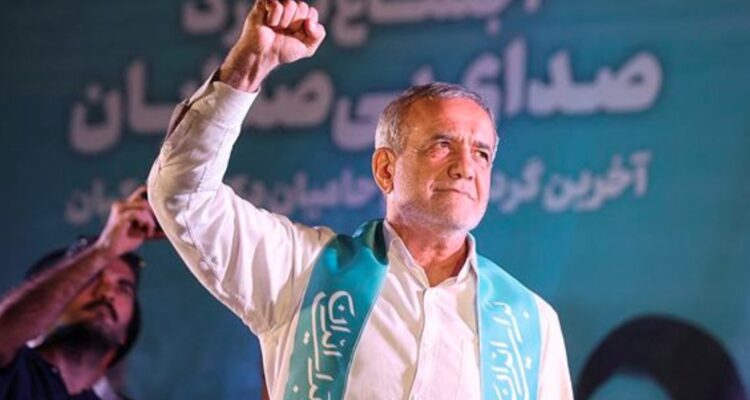The reality is that reformers are not sincere in changing Iran’s system, but rather want to make it palatable to diplomats.
By Michael Rubin, Middle East Forum
Iranians elected Masoud Pezeshkian, a surgeon turned politician and a supposed reformist, for a four-year term following the sudden death of Ebrahim Raisi, a cleric whose hard-line rhetoric mirrored that of Supreme Leader Ali Khamenei.
On cue, Western journalists and think tank analysts bought his self-description hook, line, and sinker.
“Iranian reformist wins presidency, seeks engagement with the West,” the Washington Post headlined.
The New York Times declared him, without qualification, a “reformist [who] wants warmer relations with the West.”
NPR, which previously took money from the pro-Islamic Republic Ploughshares Fund in a pay-to-play scheme, likewise declared Pezeshkian an unqualified reformist.
So too did these outlets accept at face value Iranian statistics.
Khamenei repeatedly cites voter participation as a testament to regime legitimacy, especially after the 2022 “Woman, Life, Freedom” movement.
It is always careless to accept data from dictators, and ironic that the same journalists who pour over the latest election results in the United States would report uncritically poll statistics provided by the Islamic Republic of Iran.
Their depiction of Iranian elections as equivalent to American ones also blinds them to how Iranians signal their disdain for the regime.
The relevant election statistic is not voter participation, but rather the number of spoiled ballots.
Because Khamenei compels citizens to vote under threat of job loss or university disqualification to inflate participation rates, many Iranians respond by receiving proof of participation and then spoiling their ballots, a phenomenon even Khamenei has acknowledged in his periodic speeches.
Iran’s clerical leadership tightly controls elections, vets candidates, and allows on average fewer than 2% to run.
This means that the difference between reformists and hardliners is negligible when compared to the broader Iranian political spectrum.
Nor should election outcomes surprise analysts. There is a three-decade rotation of hardliners and reformers.
“Reformist” Mohammad Khatami succeeded Ali Akbar Hashemi Rafsanjani, and hardliner Mahmoud Ahmadinejad succeeded Khatami.
Diplomats cheered the election of “moderate” Hassan Rouhani, only to have “hard-liner” Raisi come next.
At issue is not shifting Iranian attitudes, but rather Khamenei’s desire to keep all factions off balance and prevent any single one from establishing a bureaucratic position it could leverage against him.
To their credit, nearly three decades after Khatami rose to power promising a “dialogue of civilizations,” journalists and diplomats no longer pretend that reformists have the capacity to change policy.
What too many observers of Iranian policy get wrong, however, is the assumption that reformists sincerely want to change the system in any meaningful way.
Western officials scorned Ahmadinejad’s Holocaust denial, for example, but ignored that it was Khatami, the diplomatic darling of Secretary of State Madeleine Albright’s eye, who gave asylum to Wolfgang Frohlick and Jurgen Graf, two of the world’s most notorious Holocaust deniers.
While Mir-Hossein Mousavi led the supposedly reformist “Green Movement,” he refused to renounce his 1987 statement that the mining of U.S.-flagged tankers in the Persian Gulf represented “an irreparable blow on America’s political and military prestige.”
No Iranian reformist resigned in protest to the regime’s murder and mutilation of “Woman, Life, Freedom” movement protesters, nor have any denounced Iran’s long history of hostage-taking.
Capital punishment statistics show public executions increase during reformist administrations. There are two likely explanations.
First, reformist presidents wish to signal to Iranians that reformist rhetoric is for export only. Second, reformists understand that Western diplomats’ desperation for diplomacy leads them to ignore such abuses.
The same pattern holds true with Iranian nuclear developments.
Iran’s nuclear program advances disproportionately under reformists as Western diplomats let their guard down while Iranian diplomats whisper sweet nothings into their ears.
This is no coincidence.
Abdollah Ramezanzadeh, Khatami’s spokesman, expounded in a 2008 interview that the purpose of dialogue was not to compromise, but to avoid sanctions.
“We had an overt policy, which was one of negotiation and confidence building, and a covert policy, which was continuation of the activities,” he explained.
The reality is that reformers are not sincere in changing Iran’s system, but rather want to make it palatable to diplomats.
They are the good cop to Khamenei’s bad cop. Both, however, aim for the same goals: theocratic supremacy, a nuclear arsenal, America’s humiliation, and Israel’s destruction.




